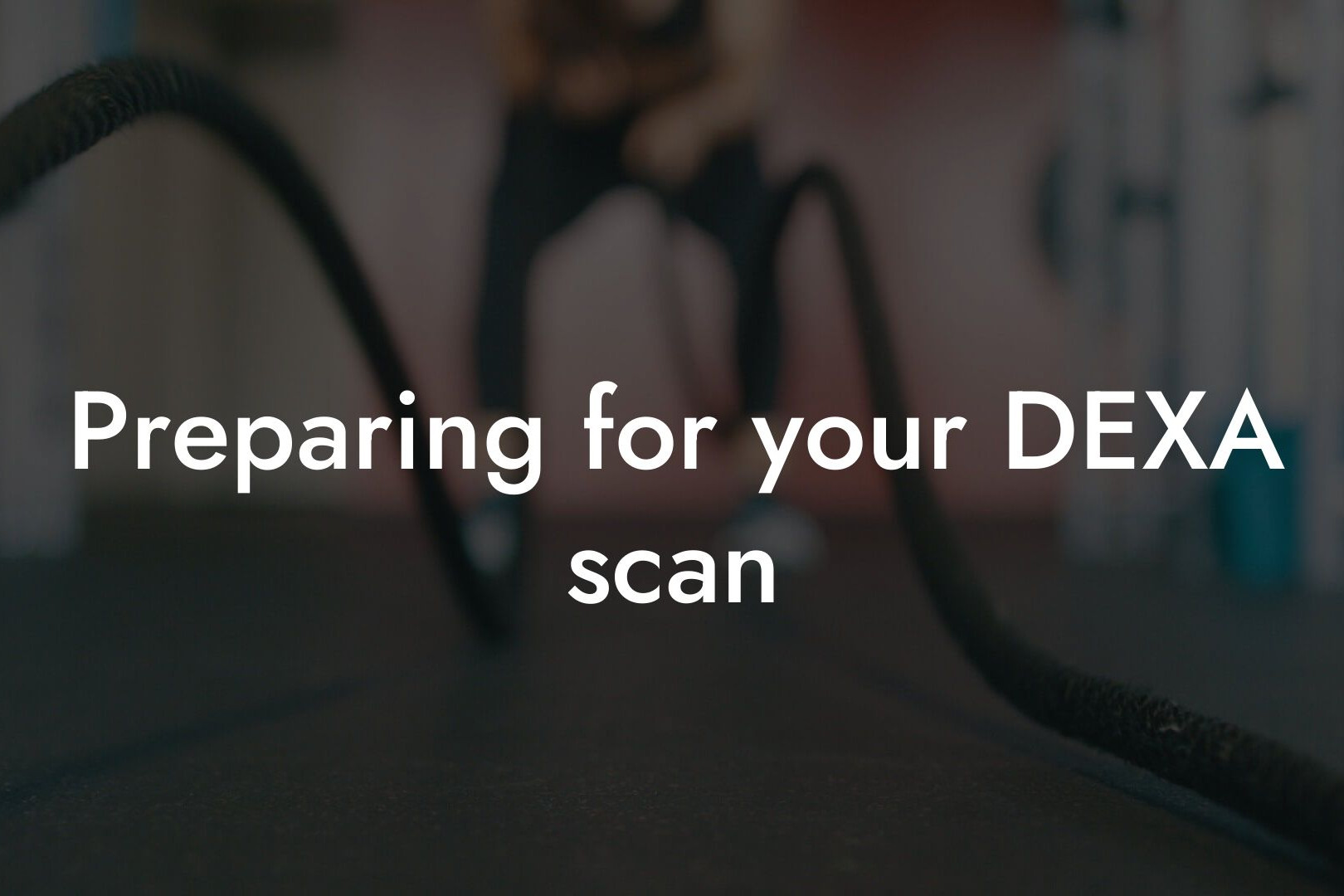As a high-earning professional, taking care of your physical appearance and overall health is crucial to performing at your best. At Tano Performance Group, we understand the importance of accurate body assessments, which is why we utilize DEXA (Dual-Energy X-ray Absorptiometry) scans to provide our clients with a comprehensive understanding of their body composition. But how accurate are DEXA scans, and what can you expect from this technology?
Table of Contents
What is a DEXA Scan?
A DEXA scan is a non-invasive, pain-free medical imaging test that uses low-level X-rays to measure bone density, body composition, and fat distribution. The scan itself takes around 10-15 minutes to complete and involves lying on a flat table while an X-ray arm passes over your body. The resulting images provide a detailed breakdown of your body's composition, including bone density, lean mass, and fat mass.
How Does a DEXA Scan Work?
The DEXA scan works by emitting two X-ray beams with different energy levels. One beam is high-energy, while the other is low-energy. The difference in absorption rates between these two beams allows the scanner to distinguish between different tissue types, such as bone, lean mass, and fat. This information is then used to generate a detailed report outlining your body composition and bone density.
What Can a DEXA Scan Measure?
A DEXA scan can measure a range of parameters, including:
- Bone density: DEXA scans can assess bone density in various regions of the body, including the spine, hips, and wrists. This information is essential for diagnosing osteoporosis and monitoring bone health.
- Body fat percentage: DEXA scans can accurately measure body fat percentage, providing a comprehensive understanding of your body composition.
- Lean mass: The scan can also measure lean mass, which includes muscle tissue, organs, and other non-fat tissues.
- Fat distribution: DEXA scans can provide a detailed breakdown of fat distribution throughout the body, including visceral fat, which is a key indicator of overall health.
Accuracy of DEXA Scans
DEXA scans are widely recognized as a highly accurate method for measuring body composition and bone density. Studies have consistently shown that DEXA scans have a high degree of precision, with accuracy rates ranging from 95% to 99%.
The accuracy of DEXA scans is due in part to the technology's ability to distinguish between different tissue types. The dual-energy X-ray beams allow for precise measurements of bone density and body composition, reducing the risk of errors or inaccuracies.
Factors Affecting DEXA Scan Accuracy
While DEXA scans are highly accurate, there are certain factors that can affect the accuracy of the results. These include:
- Movement during the scan: Any movement during the scan can affect the accuracy of the results. It's essential to remain still and follow the technician's instructions to ensure accurate readings.
- Metal implants or jewelry: Metal implants or jewelry can interfere with the X-ray beams, affecting the accuracy of the results. It's best to remove any metal objects before undergoing a DEXA scan.
- Weight changes: Significant weight changes between scans can affect the accuracy of the results. It's essential to maintain a consistent weight to ensure accurate comparisons between scans.
Benefits of DEXA Scans
DEXA scans offer a range of benefits, including:
- Accurate body composition analysis: DEXA scans provide a detailed breakdown of body composition, allowing you to track changes and make informed decisions about your diet and exercise routine.
- Early detection of osteoporosis: DEXA scans can detect osteoporosis in its early stages, allowing for timely interventions and treatment.
- Personalized fitness and nutrition planning: With accurate body composition data, you can create personalized fitness and nutrition plans tailored to your specific needs and goals.
In conclusion, DEXA scans are a highly accurate and reliable method for measuring body composition and bone density. By understanding how DEXA scans work and what they can measure, you can make informed decisions about your health and fitness. At Tano Performance Group, we are committed to providing our clients with the most accurate and comprehensive body assessments available, helping you achieve your goals and take your business to the next level.
If you're interested in learning more about DEXA scans or would like to schedule a scan, please don't hesitate to contact us. Our team of experts is dedicated to helping you achieve optimal health and performance.
Frequently Asked Questions
What is a DEXA scan?
A DEXA (Dual-Energy X-ray Absorptiometry) scan is a non-invasive medical test that measures bone density and body composition. It uses X-rays to produce images of the inside of the body, which are then used to calculate bone density and body fat percentage.
What is the purpose of a DEXA scan?
The primary purpose of a DEXA scan is to measure bone density, which can help diagnose osteoporosis, a condition characterized by brittle and porous bones. Additionally, DEXA scans can provide information on body composition, including lean mass and fat mass, which can be useful for athletes and individuals looking to optimize their physique.
How accurate are DEXA scans?
DEXA scans are highly accurate, with a margin of error of around 1-2%. This makes them a reliable tool for measuring bone density and body composition.
What are the benefits of getting a DEXA scan?
DEXA scans offer several benefits, including early detection of osteoporosis, monitoring of bone density changes over time, and tracking of body composition changes. They can also provide valuable information for athletes looking to optimize their performance and physique.
How does a DEXA scan work?
A DEXA scan uses X-rays to produce images of the body. The X-rays are absorbed by the body in different amounts, depending on the density of the tissue. The machine then uses these images to calculate bone density and body composition.
Is a DEXA scan painful?
No, a DEXA scan is a non-invasive and painless procedure. It typically takes around 10-15 minutes to complete, and you will be asked to lie still on a table during the scan.
What do I need to do to prepare for a DEXA scan?
You do not need to do anything special to prepare for a DEXA scan. However, it's recommended that you avoid wearing clothing with metal fasteners or accessories, as these can interfere with the scan.
How often should I get a DEXA scan?
The frequency of DEXA scans depends on your individual needs and health status. If you're at risk of osteoporosis, your doctor may recommend regular scans to monitor bone density changes. If you're an athlete, you may want to get a scan every 6-12 months to track changes in body composition.
What are the risks associated with DEXA scans?
DEXA scans are generally safe, but they do involve some radiation exposure. However, the amount of radiation is very small, and the benefits of the scan typically outweigh the risks.
How long does it take to get the results of a DEXA scan?
The results of a DEXA scan are typically available within a few days. Your doctor or healthcare provider will review the results with you and provide recommendations based on the findings.
What do the results of a DEXA scan mean?
The results of a DEXA scan will provide information on your bone density and body composition. The scan will produce a T-score, which compares your bone density to that of a healthy young adult. A T-score of -1 or higher is considered normal, while a score of -2.5 or lower indicates osteoporosis.
Can I use a DEXA scan to track my progress?
Yes, DEXA scans can be a valuable tool for tracking changes in bone density and body composition over time. This can be especially useful for athletes looking to optimize their physique and performance.
How does a DEXA scan compare to other body composition tests?
DEXA scans are considered one of the most accurate methods of measuring body composition. They are more accurate than methods such as bioelectrical impedance analysis (BIA) and skinfold measurements, and are comparable to hydrostatic weighing and air displacement plethysmography (ADP).
Can I get a DEXA scan if I'm pregnant or breastfeeding?
It's generally not recommended to get a DEXA scan if you're pregnant or breastfeeding, as the radiation exposure may pose a risk to the fetus or baby. However, your doctor or healthcare provider may recommend a scan in certain circumstances.
How much does a DEXA scan cost?
The cost of a DEXA scan varies depending on the location and provider. On average, the cost ranges from $100 to $300.
Is a DEXA scan covered by insurance?
Insurance coverage for DEXA scans varies depending on the provider and the reason for the scan. If you're getting a scan for medical reasons, such as osteoporosis diagnosis, it may be covered by insurance. However, if you're getting a scan for athletic or cosmetic purposes, it may not be covered.
Can I get a DEXA scan at my doctor's office?
Some doctor's offices may offer DEXA scans, but it's more common to have the scan performed at a hospital or imaging center.
How does a DEXA scan differ from a bone density test?
A DEXA scan is a type of bone density test, but not all bone density tests are DEXA scans. Other types of bone density tests include quantitative computed tomography (QCT) and peripheral dual-energy X-ray absorptiometry (pDXA).
What are the limitations of DEXA scans?
DEXA scans have some limitations, including the fact that they may not be accurate for individuals with metal implants or severe obesity. Additionally, they may not provide information on muscle mass or visceral fat.
Can I use a DEXA scan to diagnose other health conditions?
While DEXA scans are primarily used to measure bone density and body composition, they may also be used to diagnose other health conditions, such as sarcopenia (muscle loss) or visceral fat accumulation.
How does a DEXA scan fit into my overall health and fitness plan?
A DEXA scan can provide valuable information on your body composition and bone density, which can help you optimize your diet and exercise plan. It can also help you track changes over time and make adjustments as needed.
What should I do if I'm concerned about my DEXA scan results?
If you're concerned about your DEXA scan results, you should discuss them with your doctor or healthcare provider. They can provide guidance on the next steps to take and recommend any necessary treatments or lifestyle changes.
Here are some related articles you might love...
- How often should you get a DEXA scan?
- Preparing for your DEXA scan
- Benefits of DEXA scans for professionals
- DEXA scans for athletes vs general population
- What is a DEXA scan?
- Understanding DEXA scan results
- How DEXA scans measure body fat
- DEXA scan vs other body composition tests (e.g., BMI, calipers)
- Cost of a DEXA scan: Is it worth it?
Zak Faulkner
Zak Faulkner is a leading authority in the realm of physical health and body composition analysis, with over 15 years of experience helping professionals optimise their fitness and well-being. As one the experts behind Tano Performance Group, Zak has dedicated his career to providing in-depth, science-backed insights that empower clients to elevate their physical performance and overall health.
With extensive knowledge of DEXA technology, Zak specializes in delivering comprehensive body assessments that offer precise data on body fat, muscle mass, bone density, and overall physique. His expertise enables individuals to make informed decisions and achieve their fitness goals with accuracy and confidence. Zak’s approach is rooted in a deep understanding of human physiology, combined with a passion for helping clients unlock their full potential through personalised strategies.
Over the years, Zak has earned a reputation for his commitment to excellence, precision, and client-focused service. His guidance is trusted by top professionals who demand the best when it comes to their health. Whether advising on fitness programs, nutritional strategies, or long-term wellness plans, Zak Faulkner’s insights are a valuable resource for anyone serious about taking their health and fitness to the next level.
At Tano Performance Group, Zak continues to lead our Content Team revolutionising how professionals approach their physical health, offering unparalleled expertise that drives real results.




